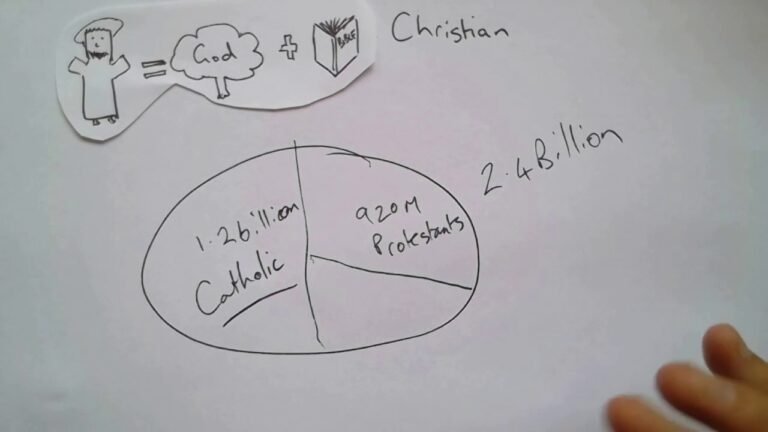Understanding the Difference Between Catholics and Christians
Understanding the distinction between Catholicism and Christianity can be both enlightening and essential for grasping the broader landscape of faith. While all Catholics are Christians, not all Christians are Catholics, as Christianity encompasses a diverse range of denominations and beliefs. This article delves into the key differences, exploring theological foundations, practices, and the historical context that shapes these two influential branches of faith. Whether you’re seeking clarity for personal reasons or simply curious about religious diversity, join us as we unravel the nuances that define Catholicism and Christianity.
What distinguishes Catholicism from other Christianity forms?
Catholicism emphasizes tradition, the authority of the Pope, and sacraments, whereas other Christian denominations may prioritize scripture and personal interpretation.
What is the primary distinction between Catholicism and Christianity?
Roman Catholicism stands apart from other Christian denominations primarily due to its distinct understanding of sacraments. While all Christians recognize the significance of sacraments as means of grace, Catholics uphold seven sacraments as essential to their faith, including the Eucharist and Confirmation, which are viewed as vital for spiritual growth and salvation. This sacramental framework shapes the Catholic experience of worship and community life in unique ways.
Another key difference lies in the relationship between the Bible and tradition. Catholics hold that both Scripture and sacred tradition are equally authoritative, forming a single source of divine revelation. This contrasts with many other Christian groups that emphasize Scripture alone as the foundation of their faith. As a result, Catholic teachings often reflect a rich tapestry of historical practices and interpretations that have evolved over centuries.
Lastly, the Catholic Church places a strong emphasis on the role of the Virgin Mary and the saints, who are seen as intercessors in the life of believers. This veneration is more pronounced in Catholicism compared to many other Christian traditions, which may focus more directly on a personal relationship with God. Additionally, the papacy plays a critical role in Catholicism, providing a central authority that guides doctrine and practice, further distinguishing it from the broader Christian landscape.
Do Catholics and Christians believe in the same God?
All Christians, regardless of their denomination—be it Catholic, Orthodox, Protestant, or Pentecostal—worship the same God. This shared belief unites them in their faith, emphasizing a common foundation rooted in the teachings of Jesus Christ. Despite differences in practices and traditions, the essence of their devotion remains focused on a singular divine entity, highlighting the universal nature of Christianity.
What are the beliefs of Catholics?
Catholics uphold the belief in a single, omnipotent God who reveals Himself in a triune nature. This divine mystery encompasses the Father, the Son, and the Holy Spirit, each person fully God yet distinct from one another. This foundational belief shapes their understanding of creation, salvation, and the relationship between humanity and the divine.
In addition to the Trinity, Catholics emphasize the importance of the sacraments as means of grace, with the Eucharist being central to their worship. They view the Church as the body of Christ on Earth, guiding believers in their spiritual journey and fostering a community rooted in faith, love, and service. This rich tapestry of beliefs not only defines their spirituality but also inspires a commitment to living out their faith in everyday life.
Unpacking Beliefs: Catholics vs. Christians
The distinction between Catholics and other Christian denominations often hinges on core beliefs and practices that shape their faith experiences. Catholics adhere to traditions established by the Church, emphasizing the sacraments, the authority of the Pope, and the importance of community worship. This structure fosters a sense of continuity and connection to a historical lineage, which many find enriching in their spiritual journey.
On the other hand, many Christians outside of Catholicism prioritize personal interpretation of the Bible and a more individualized relationship with God. This perspective often leads to diverse worship styles and theological interpretations, reflecting a broader range of beliefs. While both Catholics and other Christians share foundational beliefs in Jesus Christ and the Holy Spirit, their differing approaches to faith and community highlight the rich tapestry of Christianity, inviting dialogue and understanding among its followers.
Faith Foundations: Key Distinctions Explained
In the realm of faith, understanding the core distinctions between various belief systems is essential for fostering meaningful dialogue and mutual respect. At the heart of these differences lies the concept of divinity. Some traditions emphasize a singular, all-powerful deity, while others embrace a pantheon of gods or spiritual forces. This foundational belief not only shapes individual spiritual journeys but also influences communal practices and ethical frameworks.
Another key distinction lies in the texts and teachings that guide adherents. Sacred scriptures serve as the cornerstone for many faiths, providing historical narratives, moral directives, and spiritual insights. However, interpretations of these texts can vary widely, leading to diverse denominations and practices within the same faith. This dynamic interplay between scripture and interpretation highlights the richness of religious thought and the importance of context in understanding each tradition’s unique perspective.
Finally, the role of ritual and community cannot be overlooked. Different faiths manifest their beliefs through distinct rituals, ranging from daily prayers to elaborate ceremonies. These practices not only reinforce individual faith but also cultivate a sense of belonging among practitioners. As communities gather to celebrate their beliefs, they create bonds that transcend individual differences, illustrating the profound impact of faith on both personal and collective identity. By exploring these fundamental distinctions, we deepen our appreciation for the diverse tapestry of human spirituality.
Exploring Traditions: Beyond the Labels
In a world increasingly defined by labels and categories, exploring traditions invites us to delve deeper into the rich tapestry of human experience. Each tradition carries with it stories, values, and practices that transcend mere classifications, revealing the intricate connections among diverse cultures. By engaging with these customs, we uncover shared themes of resilience, celebration, and community that bind us, fostering a sense of belonging that goes beyond superficial differences.
As we embrace these traditions, we are encouraged to look past the labels that often separate us, allowing for a more profound appreciation of our shared humanity. This exploration not only enriches our understanding of others but also invites us to reflect on our own traditions—challenging us to celebrate their significance while remaining open to new experiences. In this journey, we discover that the true essence of culture lies not in rigid definitions, but in the vibrant, living expressions of life that connect us all.
Bridging the Gap: Common Ground and Divergence
In an increasingly polarized world, finding common ground is essential for fostering understanding and collaboration. While diverse perspectives can lead to innovation and growth, they often reveal deep-seated differences that challenge our ability to connect. By actively seeking dialogue and embracing empathy, we can bridge the gap between conflicting viewpoints, transforming divergence into a foundation for unity. This journey not only enriches our collective experiences but also empowers us to create solutions that reflect the richness of our varied backgrounds, ultimately paving the way for a more harmonious society.
Understanding the distinction between Catholicism and Christianity enriches our perspective on faith and community. While all Catholics are Christians, not all Christians are Catholics, highlighting the diverse expressions of belief within the broader Christian tradition. By exploring these differences, individuals can appreciate the unique practices, doctrines, and histories that shape their spiritual journeys, fostering a more inclusive dialogue among various faiths. This awareness ultimately encourages deeper connections and mutual respect among believers, regardless of their specific religious affiliations.







